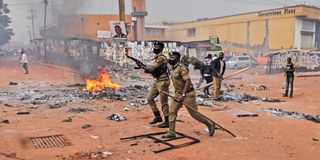Uganda needs police oversight commission

Police officers shoot to disperse protesters downtown Kampala following the arrest of NUP presidential candidate Robert Kyagulanyi on November 18. PHOTO/NMG.
What you need to know:
- Mr Mohammed Ndifunza says: Independent oversight mechanism will go a long way in serving the people.
The death of more than 50 people as a result of protests action in Uganda has shocked the nation and the world. Protests erupted on November 18 following the arrest of Opposition leader Robert Kyagulanyi, aka Bob Wine, in Luuka District.
While the deaths are being investigated, the majority of the victims were shot by police and other security agencies personnel.
The Uganda Human Rights Commission (UHRC), noted a number of serious human rights violation that occurred, including the use of excessive force, which they attribute to “some errant members of the law enforcement agencies, who were deployed to quell the protests.”
International and continental instruments are clear. The African Commission on Human and Peoples Rights Guidelines for Policing Assemblies by Law Enforcement Officials in Africa state that the intentional use of lethal force by law enforcers is prohibited unless it is strictly unavoidable in order to protect life, thus making it proportionate, and all other means are insufficient to achieve that objective, thus making it necessary.
The violence and killings on November 18 call for an independent inquiry.
According to the Minnesota Protocol on the Effective Prevention and Investigation of Extra-legal, Arbitrary and Summary Executions, the duty to investigate is an essential part of upholding the right to life.
The UN General comment No. 37 (2020) on the right of peaceful assembly calls on states to ensure independent and transparent oversight of all bodies involved with peaceful assemblies, including through timely access to effective remedies, including judicial remedies, or to national human rights institutions, with a view to upholding the right before, during and after an assembly
It is only through an inquiry that we will be able to understand what went wrong and how this can be prevented from happening again.
Unfortunately, this hasn’t been the first time Uganda has witnessed such unfortunate occurrence during protest actions. In 2009, more than 40 people were killed in two days of protests in Kampala. The reports of the inquiry instituted to investigate the protests has hardly seen the light of day.
A response to the events of November 18, however, cannot again be considered in the form of a singular one-off inquiry into the violence.
It is high time lawmakers in Uganda responded pro-actively and establish once for all, a dedicated independent police oversight system either at the level of a commission or authority that is equipped with the requisite capacity and skills required to investigate complex policing actions and operations.
While UHRC has made some commendable work in regard to the nature and complexity of policing, it requires a certain level of specialised oversight.
Specifically, the commission or authority should be empowered to investigate deaths and severe injuries caused by police action; investigate police misconduct at all levels; monitor, review and audit the investigation and actions of the internal accountability mechanisms within the UPF such as the Professional Standards Unit (PSU), the directorate of human rights, and the Police Disciplinary Court; monitor and investigate policing operations and deployment; receiving complaints about the UPF from the general public; make recommendations to the relevant organs for improvement of policing in Uganda, and issue periodic reports to Parliament.
This independent oversight mechanism will go a long way in serving the people and the Uganda Police Force for decades to come as critical to building a police service vested in the principles of democracy and good governance.

Author, Mr Mohammed Ndifuna. PHOTO/COURTESY.
Mr Mohammed Ndifuna is a human rights defender, and expert in atrocity crimes prevention. [email protected]




